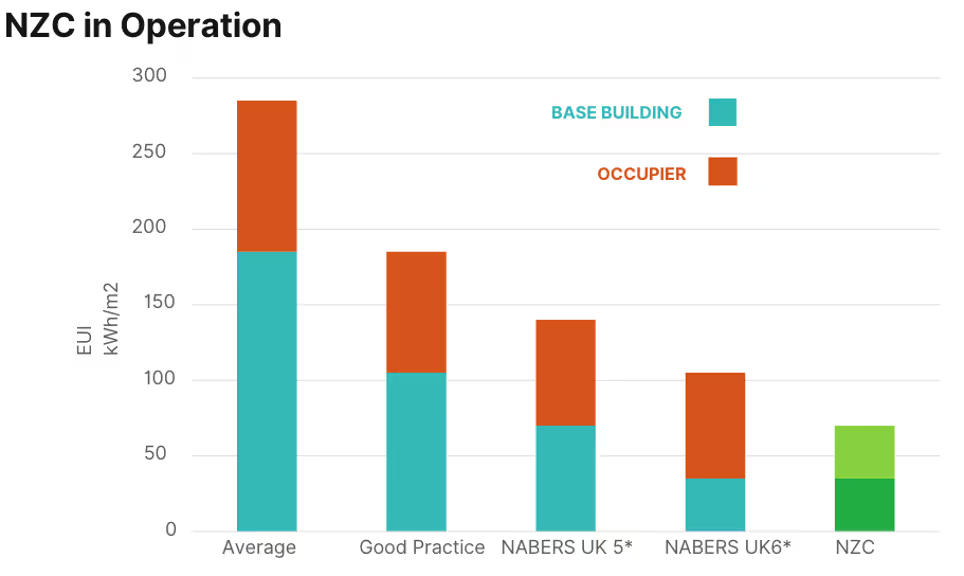In the world of commercial real estate, the relationship between tenants and landlords is pivotal, especially when it comes to sustainability. As environmental and social impact concerns become increasingly urgent, tenants are increasingly finding themselves in a position where they can drive the sustainability agenda. We’ve teamed up with workplace and ESG consultant, Amanda Irwin, the support behind our own evolving sustainability strategy, to outline the best way to go about questioning prospective landlords.
Doing so without straining the relationship with the landlord requires tact, clear communication, and a mutual understanding of benefits. Ultimately, it’s getting tenant concerns and queries across as early as possible, and ensuring to ask the right questions at the beginning of the relationship. Trustek’s research from the number of buildings audited in 2023, has demonstrated only 5% of buildings audited had an ESG reporting platform in place, and with hundreds of companies championing NetZero Carbon (NZC), it is important to understand how your landlord can help you achieve the NetZero goal. That’s why, the first point is:
1. Start with Open Communication
Engage your landlord in a detailed discussion about the building’s current sustainability practices and policies. Ask if the property holds any sustainability certifications like BREEAM In use or NABERS, which can give you a baseline understanding of the building's environmental performance. With all buildings being required to be NetZero by 2050, the building need to be halfway to this point by 2030 so it is important to understand where the building is on this journey, as some of the interventions required may include replacement of the façade which will have serious impact to the quiet enjoyment of your space. Additionally, by asking about certifications such as WELL and Fitwel, you’ll also be able to decipher their commitment to social and wellbeing aspects, addressing the the ‘S’ in ESG.

Trustek Verified and recommended solutions include : Perse.io / Etainable /Deepki / Scaler / Arbnco / Greenly / Future+ / Invizi IBM / Measurable.Energy
2. Enquire about the approach to Energy Management and Water Conservation
In any multi-tenanted building the landlord or managing agent will procure the energy on behalf of the building. So enquire about the sources of energy, any renewable energy usage at the building. In addition to this, the building will have several energy-saving measures like efficient heating and ventilation systems or smart lighting controls that reduce the consumption relative to the levels of sunlight. Similarly, ask about water conservation measures, from sensor taps through to smart meters tracking consumption.
Trustek Verified and recommended solutions include: Demand Logic/ IBG / Dnergy / Metrikus / Trigrr / Facilio / Verv
3. Understand how you will be able to monitor your own carbon footprint
Do not take for granted that you will have access to granular floor data within your building. In 2023 the Trustek Audits identified that 48% of building still rely upon manual meter reading for reporting. Which creates a protracted workflow for you to obtain this information. So ask the question: do each tenant have their own AMR (automatic meter reading) in order to be able to monitor and report on actual use of energy and/or water use? Is this data available to tenants and if so, in what format?
Trustek Verified and recommended solutions include: GridDuck / Meterz / IGB / GoMonitor / Stark
4. Consideration for Health: Monitoring with PropTech
Understand if they have implemented any technologies that monitor health metrics such as air quality, noise levels, and water quality. Sensors can provide real-time feedback to both occupants and building managers, allowing for immediate adjustments. This real-time data can also be used to alert building management about issues that could impact tenant health, such as elevated CO2 levels or pollutants.
Trustek Verified and recommended solutions include: LightFi / Freesi / Kaiterra / Airthings / Awair / Disruptive Technologies / Rensair
5. Planning for Inclusivity and Accessibility
Ask if the landlord has met or exceeded legal standards for accessibility and inclusivity. Accessibility refers to the physical and technical features that facilitate site access, such as ramps, elevators, and support for hearing and vision impairments. Inclusivity aims to provide equitable experiences comparable to those of able-bodied individuals. Also, ensure that neuro-inclusivity is considered; this includes strategies to aid neurodiverse individuals, such as streamlined visitor check-ins, clear wayfinding, and thoughtful lighting and acoustics in shared spaces.
6. Biophilic Design Efforts
Query their commitment to biophilia, not just some greenery around the building. Biophilic design enhances well-being by combining diverse plant life with optimal natural light to improve air quality and mood. Incorporating water features and natural materials like wood and stone enriches the sensory experience. Dynamic outdoor areas also promote physical activity and social interaction, elevating the overall environment.
7. Explore Modification Opportunities
Ask upfront about the possibilities and any restrictions related to modification and upgrades to the space. Can you install sensors that adapt the energy consumption of the space? Do tenants have freedom to install energy-efficient lighting, or change existing appliances? Most importantly, check that you would not be charged to remove these at the end of theagreement.
Trustek Verified solutions include : Dimension Engineering / NEXGEN / Measurable.Energy / Verv / Metrikus / Trigrr / Freesi / LightFi / Kaiterra /Awair / Airthings
8. Budgets and Funding for Sustainability
Some landlords allocate specific budgets for sustainable upgrades. As a tenant, enquire about access to these funds and how you might contribute ideas for their use either within your own space, or building-wide.
9. Long-term Sustainability Vision
Discuss the landlord’s long-term sustainability vision for the property. Understanding their goals can help you decide if they align with your sustainability initiatives, and if your business will benefit from future sustainable projects and initiatives.
10. Incentives and Programs
Ask about any incentives for tenants who actively participate in sustainability practices. Some landlords may offer benefits like recognition programs or reduced rents for businesses who go above and beyond the benchmarks of their fellow occupants.
11. Local Community Collaboration
Query the landlord about their collaboration with local businesses, support for nonprofits, and participation in community events. These initiatives not only enhance your brand’s visibility but also open up valuable networking opportunities. Exploring opportunities for collaborative projects that involve the external community can further elevate your company's local standing. Additionally, such engagement can lead to partnerships that contribute positively to the local economy and community well-being.
12. Tenant Community Engagement
Ask the landlord about their initiatives to cultivate relationships among building tenants. This could involve organising wellness activities such as fitness classes and mindfulness sessions, learning opportunities or culinary events. Discuss broader initiatives like installing a green roof, initiating a composting program, or setting up sustainability workshops, which can enhance community bonding and environmental responsibility. Also, enquire about the coordination of these activities, potentially via a community engagement portal or app that links you with fellow occupants, fostering a unified and engaged tenant community.
Trustek Verified and recommended solutions include: Locale / Spaceflow / Equiem / VTS / SmartSpaces / HqO / Chainels / hoccoco
Conclusion
We hope the above is helpful for you as tenants when approaching your landlord about their ESG and Net Zero commitments in your building. If you want to learn more about how Trustek can advise on PropTech solutions, contact Freddie Pritchard-Smith, CEO of Trustek. If you need to discuss your workplace or ESG strategy further, get in touch with Amanda Irwin, Founder, ANI Consulting










-2.jpg)
.jpg)



